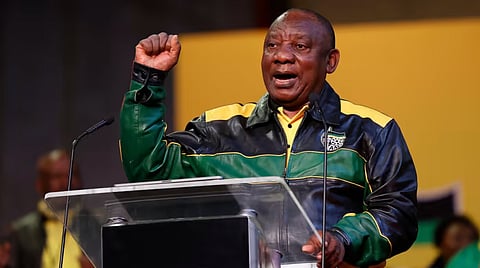Ramaphosa wins ruling party leadership race
By Amogelang Mbatha and S'thembile Cele
Cyril Ramaphosa comfortably won re-election as head of South Africa's governing party just weeks after a scandal threatened to derail his political career, and now faces an uphill battle to rebuild its flagging support heading into a national vote in 2024.
A second five-year term for Ramaphosa at the helm of the African National Congress should reassure investors that his administration will continue with reforms to revive the stuttering economy. The rand gained as much as 2.6% against the dollar.
Ramaphosa, 70, garnered 2,476 votes for the top ANC post, and former Health Minister Zweli Mkhize 1,897. He considered quitting as the nation's president earlier this month after an independent panel denounced his handling of the theft of foreign currency that was stuffed in a sofa at his game farm, but later backtracked and denied wrongdoing.
The results were announced by Kgalema Motlanthe, the ANC's head of election, at the party's elective conference on the outskirts of Johannesburg on Monday. Paul Mashatile, previously the ANC's treasurer-general, easily won the deputy leader post, Gwede Mantashe was narrowly reelected as its chairman and Transport Minister Fikile Mbalula was chosen as secretary-general.
Support for the 110-year-old ANC, which has ruled South Africa since the end of apartheid in 1994, dropped below 50% for the first time in a local government vote last year, and several opinion polls show it's in danger of losing its national majority in 2024. Confidence in the party has been eroded by its failure to head off an energy crisis and stem an economic decline that's spawned rampant unemployment, inequality and crime.
Ramaphosa is one of the country's most seasoned politicians. A former labor union leader who made a fortune after going into business, he helped to negotiate a peaceful end to White-minority rule in the early 1990s and led a panel that drafted the country's first democratic constitution.
He succeeded Jacob Zuma as the nation's president in early 2018 and pledged to tackle the economic malaise and endemic corruption that set in during his predecessor's nine-year rule.
Since then, he has effectively ended the monopoly of Eskom Holdings SOC Ltd., the debt-stricken state power utility that's subjected South Africans to intermittent blackouts since 2008, freeing companies to build their own generating plants and supply the grid. The spectrum needed to modernize the nation's telecommunications industry was sold after more than a decade of delays.
Ramaphosa has also made progress rebuilding the nation's law-enforcement capabilities that were systematically hollowed out under Zuma. Several former leaders of state companies, politicians and party officials have been charged with corruption.
He's been less successful in firing up an economy that's been battered by the coronavirus pandemic and the energy crisis, and business leaders and foreign investors have called for the acceleration of reforms needed to help reduce a 32.9% unemployment rate.
Ramaphosa's victory is good news for the ANC — a recent opinion poll showed support for the party would drop to between 30% and 40% if he were to be replaced as its leader.
Read more:
–With assistance from Paul Vecchiatto.
© 2022 Bloomberg L.P

